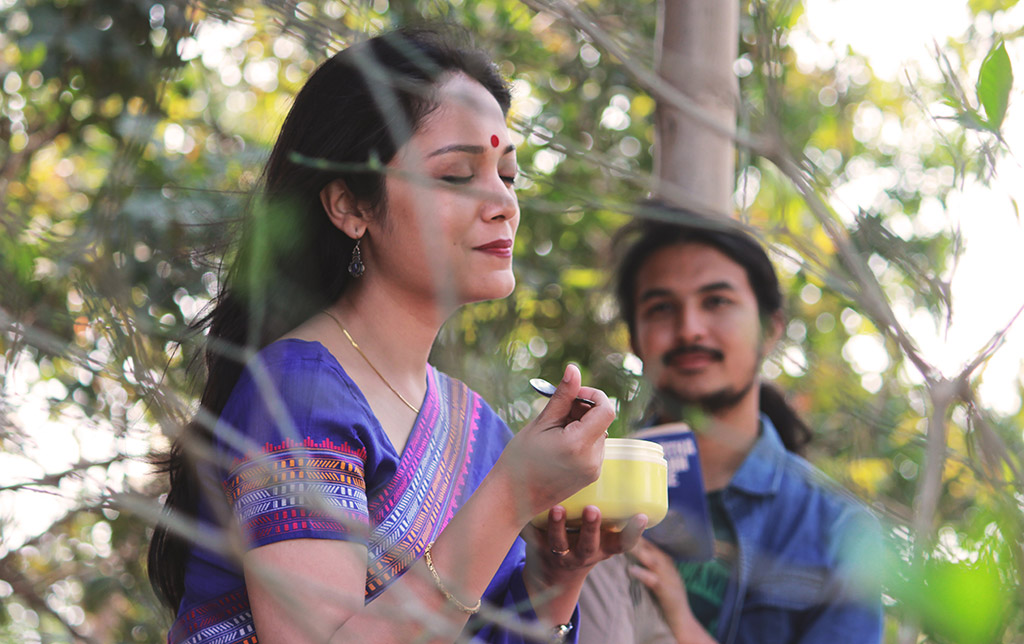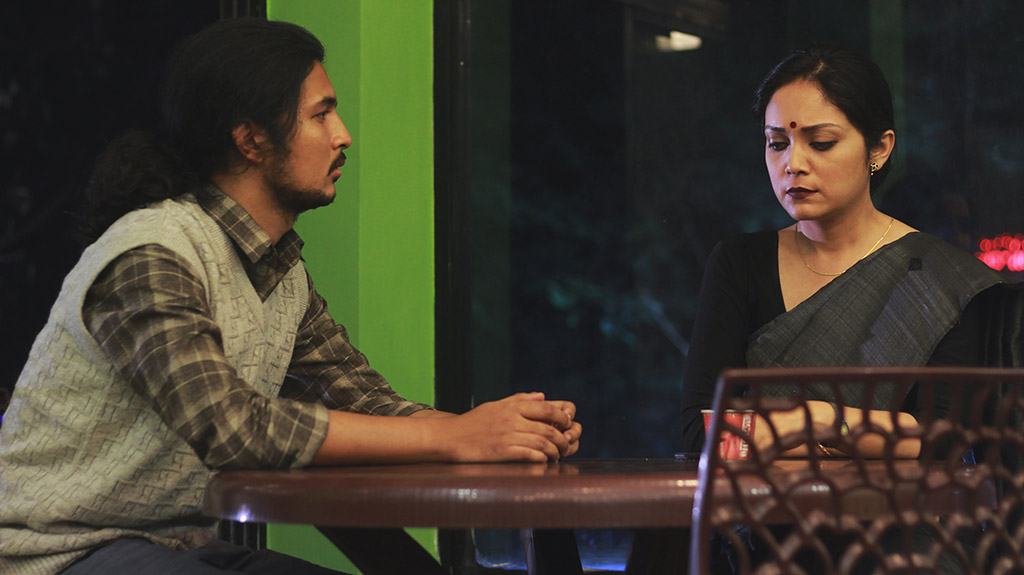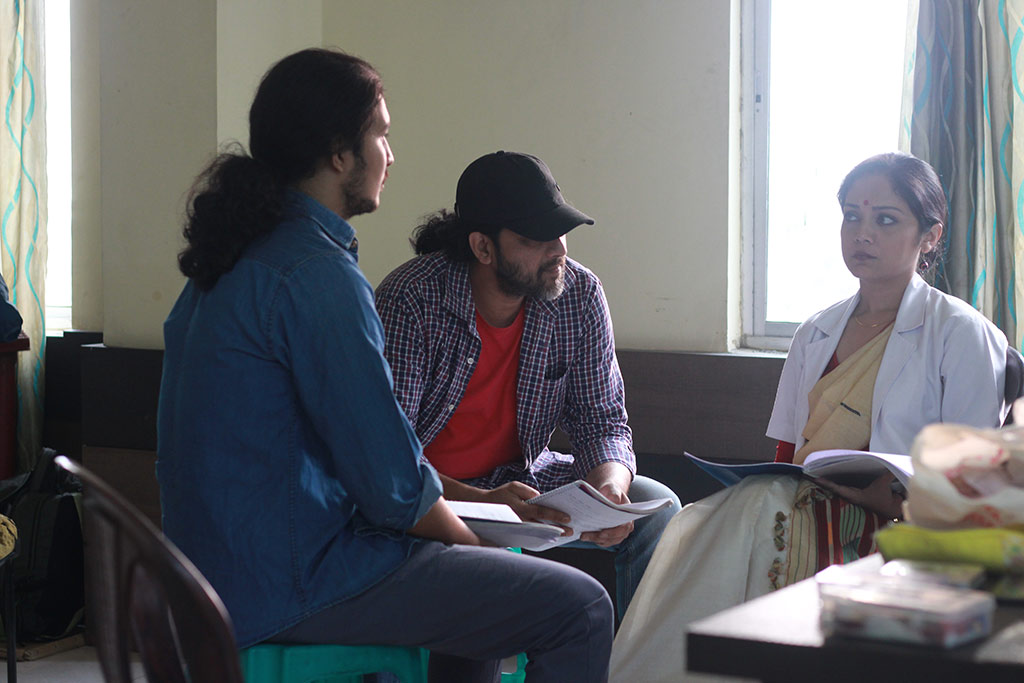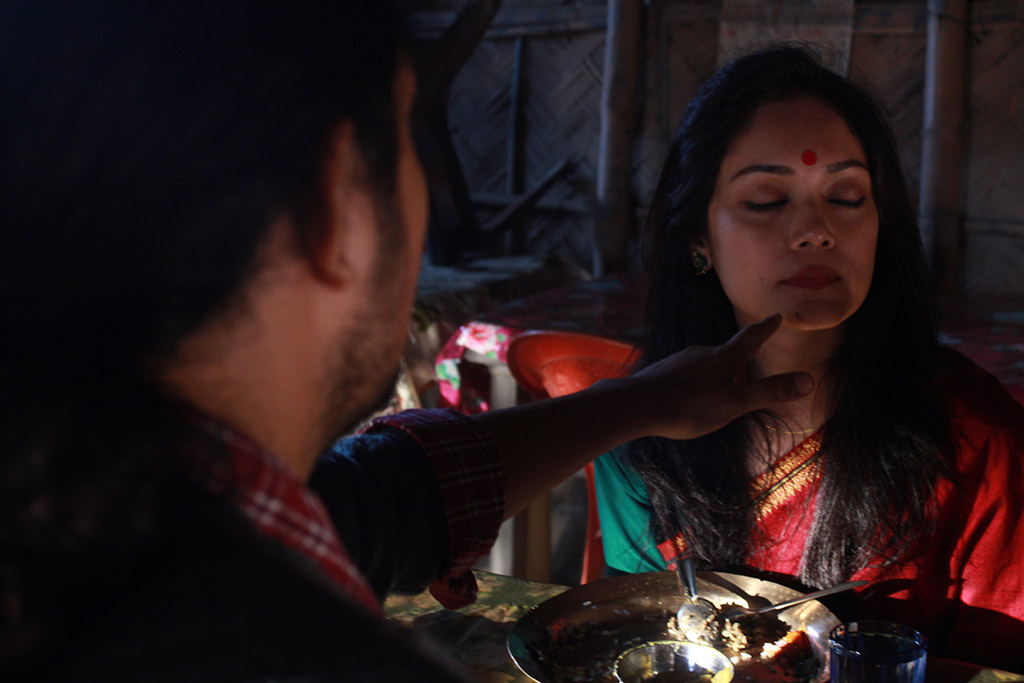A Taste of Love
Assamese film-maker Bhaskar Hazarika talks to us about his film Aamis and why a love story turning to darkness is a world apart from a dark story turning to love
Praveena Shivram
In Bhaskar Hazarika’s world, words are like the women of Shaheenbagh, relentlessly and fearlessly protesting against all that is being propounded as the norm, as something that is ‘good’ and ‘required’. Here, and by that I mean Hazarika’s world, the cinemascope version of his stories are fine examples of what the shape of possibility could be when boundaries are redrawn, when the centre shifts, when the rules no longer apply. Here, and now I mean in both spaces, words ring true because they fill the impossible void of silence, and stir the stagnant muddy waters of repressed thought. Here, ideas shine through because they reiterate the qualities of love, equality and hope.

I watched Hazarika’s Aamis (Assamese for ‘Meat’; 2019) as part of – a dynamic eight-year-old film club in Madras – early this year and the film left me deliciously uncomfortable. The film, on one level, is about a younger man falling in love with an older woman – a regular cinematic romance trope, if you must; but on another level, it explores the idea of sensuality, physicality and intimacy and the volatile textures of desire. It is unafraid of this journey, and unafraid to tread the dark realm of the senses. ‘I do deliberately seek the unusual. There is so much competition that I have to think of something different, a different way of saying and seeing things,’ he says when we speak over the phone. Our conversation is split up over two days, over scratchy Internet connectivity, over an actors’ workshop in Guwahati for the next film he is producing, and over unexpected visits to the hospital to meet an ailing relative.
*
In a promotional video for the film, Anurag Kashyap, Bollywood’s darling and misfit, who also officially presented Aamis when it released last year, says we ‘haven’t seen anything like this coming out of India’. While there is a lot in Kashyap’s cinema I don’t agree with, this I had to. Aamis is surreal, unexpected, and almost tender, like a child unconsciously running her hand over weathered skin. We have seen this kind of romance before, we know its trajectory, and, yet, there is so much we don’t know, so much that bubbles just beneath the surface, till nothing can hold it back, and we are consumed in its deluge of staid wisdom. At the screening, Hazarika said he was excited to watch the film again because he hadn’t seen it in two months. I ask him later what most film-makers say about the fatigue of watching their work too many times. ‘Usually I can’t take it beyond the 25th screening, but Aamis is something else, man. I can see it again today, right now, you know? It’s just a whole way the film was made, the cast, the crew, it was a different experience.’

At a time when ‘food porn’ is a thing on one end of the privileged spectrum and lynching for food habits at the other end where things quickly turn dystopian to our inundated eyes, Aamis subverts the politics that define how we consume food, to how we perceive ‘flesh’. The rigid boundaries set by society are unassumingly crossed, and, yet, the line is still in sight, making the horror of the unknown delectable and addictive – so that Sumon asking his veterinary doctor friend to cut a piece of his flesh to cook it for Nirmali is as deep and intimate a touch as Sumon and Nirmali, in police custody, their faces covered, holding hands in the end for the first time. The repulsion, so obviously exaggerated in Polanski’s iconic film of the same name – a psychological horror film (incidentally, Aamis too is often described as that) that also works with the dynamic of the ‘body’ and desire – is made completely nondescript in Aamis. ‘Actually, this was this was what we were trying to achieve – the fact that it became real that made the menace stronger. I was very conscious of this. I tried to normalise the horror here, and we used a lot of dramatic music, dialogue and shots to achieve that sense of horror within the everyday,’ said Hazarika.
*
Hazarika speaks like he writes. There is brevity in his sentences, with the depth of an iceberg that Ernest Hemingway would have been proud of, but also there is a reluctance, like a fan about to meet her idol, the rush of emotion settling behind hesitant feet, that you know, even before anything, are going to move forward. ‘Normally, you think as a writer you have to write beautiful passages. But the point of the script is to communicate it to the crew, who might not all be great appreciators of great writing. They just want to know what they need to do in the scene. So the simpler you write, the less you write, the better writer you are,’ he says.

There is a lot in Aamis that proves this – be it in its minimalistic dialogues, in the ease of conversation between people, in the unhurried shots of Sumon and Nirmali walking together or eating together, in the slow smiles that spread across their faces each time they receive a text from the other… even Nirmali’s feisty friend doesn’t speak more than required. The setting, characterisation and story arc are so stark and clear that words become able buffers for the silence of context. ‘As a writer, I like to believe that I am pretty fearless. I don’t let hang-ups stop me from exploring a certain thing. Eventually, who will judge me? Only myself, so I might as well just write what I want to,’ he says, and I echo his sentiments, calling his fearlessness a gift. Then he says, ‘Maybe also stupidity, because to be fearless also means to be a bit stupid, no?’
*
For someone who spent most of his growing-up years in Raipur, Chattisgarh, and later at university in Delhi, Hazarika finds that rediscovering his Assamese roots is probably the best thing that happened to his writing, to his brand of storytelling. ‘Over the past five-six years, considering where the country is going, I am coming to terms with my Assamese identity, and I think this has made my work more honest, more sincere. I don’t have that pan-Indian, generic Indian guy persona anymore. I have shed that,’ he says. And his candour is refreshing and unsettling, much like his cinema. He goes from subjects of identity and belonging, to the dismal state of indie films in India due to lack of funds, the books he loves to read (‘Edgar Allan Poe and a lot of science fiction’), to the films he wants to make (‘So many films to make!’), to his early Bollywood years and his credit as one of the writers of Abbas Mustan’s film, Players (‘Oh man, that was such a misadventure, man.’) – he goes from one to the next like the well-meaning oracles of yore, the witches and wizards who revelled in speaking their minds while dropping nuggets of truth, their boundless energy making up for the necessary rejection of man-made reality.

Over the two days that we spoke, there was one question we kept coming back to, of a particular scene that surprised Hazarika. After a couple of attempts, he said he would text me the response, but just before we hung up, he found the answer. ‘Remember this one scene where they go to eat bat meat and there is a little thing stuck on her chin? So, basically, this is a straight-off trope; it is used in so many films but not in this way. So I didn’t think it would work, you know. I thought it would look really stupid. But the way Riju Das, the DOP, so beautifully shot the scene, and it came out so well that it surprised me a lot. I was expecting this scene to fall flat, you know? But once we shot it, I knew this was going to work.’ And then he added, in fitting irony to his writing and cinema, ‘Yay, you got all your answers.’
All Images Courtesy of Bhaskar Hazarika.
Share